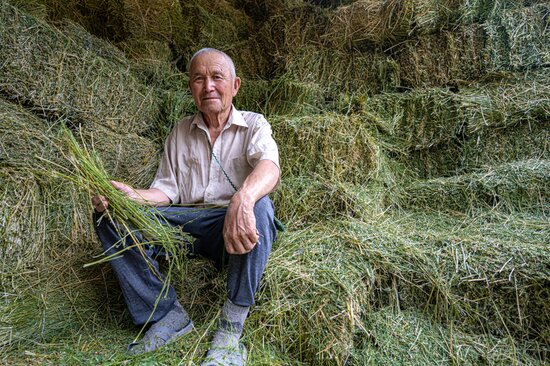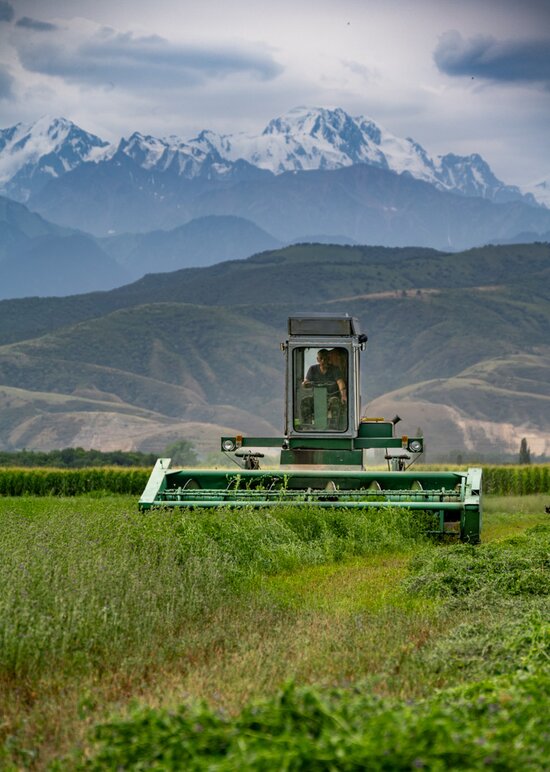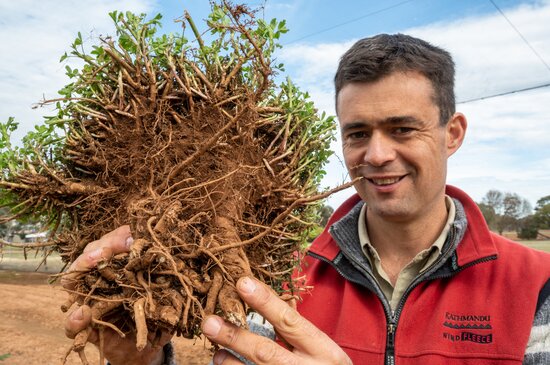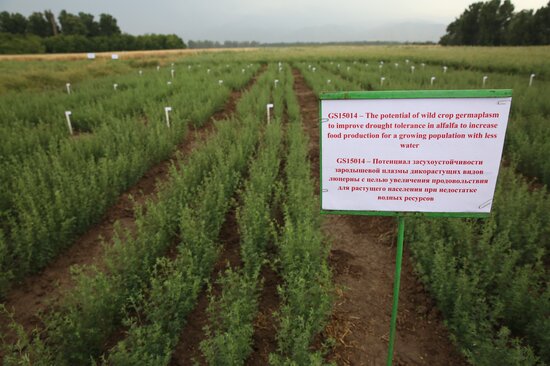New Climate-Resilient Alfalfa Gives Hope to Drought-Stricken Farmers in Kazakhstan
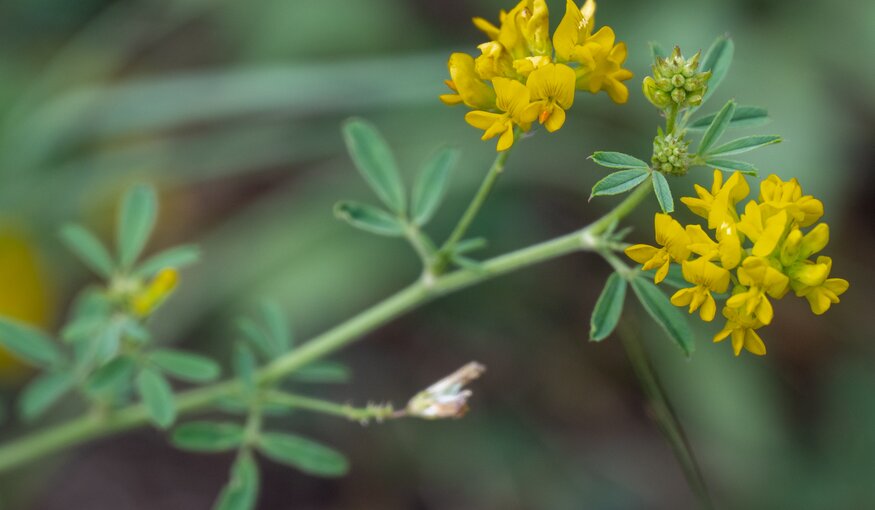
9 October 2025
-
Kazakhstan releases its first drought- and heat-tolerant variety of alfalfa, one of the world’s most important feed crops.
-
Developed thanks to wild relatives seeds stored in local and global genebanks, the new variety offers farmers reliable harvests despite climate stress.
-
The variety was developed as part of the global BOLD project, which is using crop diversity to ensure food security.
Astana, Kazakhstan, 9 October 2025 – A collaboration between plant breeders in Australia and Kazakhstan has tapped the diversity found in wild alfalfa to produce an exceptionally drought- and heat-tolerant variety of this high-protein livestock forage. The advance can revitalize and even expand production in a country constrained by water shortages.
“This new variety is of immediate value to farmers in Kazakhstan. Retreating glaciers are depriving them of water they typically use to irrigate alfalfa fields, which support about 75% of our milk supply,” said Professor Galiolla Meiirman, who leads alfalfa work at the Kazakhstan Scientific Research Institute for Agriculture and Plant Growing (KSRIAPG). “It will enable them to cultivate alfalfa as a rain-fed crop, an option that may capture the attention of farmers worldwide.”
The new variety, called Tozimdi – which means “stable” or “sustainable” in Kazakh – was produced in collaboration with the Australian Pastures Genebank at the South Australian Research and Development Institute (SARDI). The work was funded by the Biodiversity for Opportunities, Livelihoods and Development (BOLD) project, which is led by the Crop Trust with financial support from the government of Norway.
The Tozimdi variety was developed by breeding local alfalfa with its wild relatives that are naturally endowed with traits that allow healthy growth with relatively small amounts of water. These wild alfalfa species can also withstand an exceptional range of temperatures, from -20 to 40 degrees Celsius (4 to 104 degrees Fahrenheit).
“Farmers in Kazakhstan are concerned that they can no longer rely on glacial meltwaters of the Tien Shan mountains to irrigate their alfalfa fields, and that’s a threat to them and the food systems they support,” said Dr Alan Humphries, curator of the Australian Pastures Genebank and leader of the BOLD alfalfa breeding project. “We’re optimistic that this new variety can support their livelihoods and help them provide sustainable and affordable food for consumers in Kazakhstan.”
Humphries noted that rain-fed alfalfa varieties can address water-related threats to food systems all around the world, not just in Central Asia. Alfalfa is grown as livestock feed in over 80 countries both for domestic use and for export. In the United States, for example, it’s typically cultivated in irrigated fields, and increased alfalfa production in regions like the Colorado River Basin is clashing with rising water scarcity and competition from other users.
A Win-Win for the Environment and Livelihoods
Tozimdi is expected to bring a range of environmental benefits. It can deliver stable forage even in drylands, provide green cover that slows desertification and help improve soil structure and fertility.
For Kazakhstan’s farmers, the economic gains are clear. This high-yielding variety delivers three to four harvests per year. It can boost milk and meat production thanks to its high nutritional value and resilience to drought and lower the costs of raising livestock.
Farmers were involved in testing the new variety across a broad range of environments in four regions of Kazakhstan: Kyzylorda, South Kazakhstan, Zhambyl and Almaty. They were impressed with its drought resistance, yield potential, feed quality and winter hardiness. They especially valued the variety’s ability to produce more biomass during the cooler, wetter periods at the beginning and end of the growing season, while also demonstrating resilience through the hot, dry summer months.
"If it keeps like this without watering, Tozimdi is our best option. We will continue to sow it and recommend it to our neighbors,” said Meirim Bulaev, a farmer from the village of Sauynshy.
A Global Effort
The alfalfa breeding work in Kazakhstan is one of seven BOLD initiatives that draw on the genetic diversity of their wild relatives to enhance the climate resilience of food and forage crops. Other recent successes include new varieties of durum wheat in Morocco, potato in Peru and rice in Vietnam.
Global collaborations are vital to this work. In the case of Tozimdi, SARDI led the development of the variety, drawing on alfalfa diversity – stored at its genebank – that originated from different regions, including Chile and the Kazakh desert.
The alfalfa crosses that breeders made and evaluated and that led to Tozimdi have also been shared with researchers in Kyrgyzstan and Zambia who are working with farmers to develop alfalfa varieties that will be adapted to local needs. In Zambia, the recent introduction of alfalfa as a livestock feed has substantially increased their milk yields. Developing a locally adapted, climate-resilient alfalfa variety – building on the success of Tozimdi – will allow Zambian scientists to further boost the livelihoods of local farmers. Plant breeders in Morocco and Oman have also expressed interest in Tozimdi.
“The release of Tozimdi shows that the solutions to farmers’ needs can be found in scientists’ labs, genebanks and farmers’ fields,” said Dr Benjamin Kilian, who coordinates BOLD. “We can tap the power of crop diversity to help farmers everywhere adapt to extreme weather, safeguard food security and build resilient farming systems.”
For more information, please contact:
Luis Salazar at luis.salazar@croptrust.org or +33 6 99 70 3434
Lynda Mwakisha at lmwakisha@burness.com or +254 704 589 177
Notes to Editors
About alfalfa
- Alfalfa is a perennial forage plant from the legume family, widely used in livestock farming. It is rich in protein, vitamins and minerals and is well-suited for the diet of cattle, sheep and goats.
- A member of the pea family, alfalfa is one of the world’s most important feed crops for livestock.
- Farmers value alfalfa for its long taproot that can draw out moisture stored deep in the soil. That helps extend alfalfa’s growing season during dry conditions.
- Alfalfa can improve soil by absorbing nitrogen – a critical nutrient for farming – from the air and converting it to usable nitrogen in the soil.
- Animals who feed on alfalfa hay tend to gain weight faster, produce more milk and are healthier than those fed other forages.
- As the foundation of Kazakhstan’s livestock feed base, alfalfa is critical to the country‘s food security. Without secure, sustainable feed resources, livestock production becomes unstable, which can drive up food prices, threaten nutrition and make communities more vulnerable to shocks.
About the Crop Trust
The Crop Trust is an international organization working to conserve crop diversity and thus protect global food and nutrition security. At the core of Crop Trust is an endowment fund dedicated to providing guaranteed long-term financial support to key genebanks worldwide. The Crop Trust supports the Svalbard Global Seed Vault and coordinates large-scale projects worldwide to secure crop diversity and make it available for use, globally forever and for the benefit of everyone. The Crop Trust is recognized as an essential element of the funding strategy of the International Treaty on Plant Genetic Resources for Food and Agriculture. Learn more at www.croptrust.org
About the BOLD project
BOLD (Biodiversity for Opportunities, Livelihoods and Development) is a 10-year project to strengthen food and nutrition security worldwide by supporting the conservation and use of crop diversity. Funded by the Government of Norway and launched in 2021, it builds on the work and achievements of the decade-long Crop Trust-led Crop Wild Relatives Project, also funded by Norway. The Project is led by the Crop Trust in close partnership with the Norwegian University of Life Sciences (NMBU), the Nordic Genetic Resource Center (NordGen) and the International Treaty on Plant Genetic Resources for Food and Agriculture. Learn more https://bold.croptrust.org
About the South Australian Research and Development Institute (SARDI)
SARDI is a division of the Department of Primary Industries and Regions South Australia (PIRSA). It is the South Australian Government’s principal research institute for primary industries, creating opportunities to ensure the agriculture, food, aquatic and bioscience industries are internationally competitive and ecologically sustainable. SARDI focusses on food safety and innovation, production systems and productivity enhancement, water utilization and climate adaptation, product integrity, plant breeding, molecular diagnostics, market access, supplier competitiveness and biosecurity. SARDI research divisions are aquatic, livestock and food, and crop sciences. SARDI has more than 300 scientific, technical and support staff and has management responsibility for 12 research centers across South Australia. Learn more https://pir.sa.gov.au/sardi
About the Kazakh Research Institute of Agriculture and Plant Growing (KRIAPG)
The institute is a major scientific center of Kazakhstan for agriculture and plant growing in the southeast of the country. It was founded in 1934 as the Kazakh Scientific Research Institute of Farming, named after W. Williams. It has been registered in the system of the Kazakh Ministry of Agriculture since 2002. Its work specializes in the system of agriculture of the southeast of Kazakhstan, selection and seed growing of grain, leguminous, oil and industrial crops. https://kazniizr.kz/en/about-institute/
Categories: For The Press, Press Releases, BOLD, Alfalfa, Environmental Restoration, Food Security, Sustainable Agriculture

